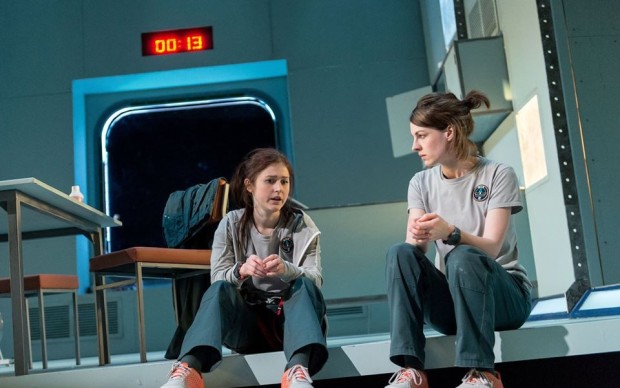You have no items in your cart. Want to get some nice things?
Go shopping
“Aggressively theatrical.” That’s how Alistair McDowall has described his new Pluto-based play X in an interview with The Independent, and that was lingering in my mind when I sat down to watch it at the Royal Court. Expecting to be both mightily confused and reduced to a nervous wreck, instead I was greeted with a piece of bold theatre that lingers around in the back of the mind, daring you to try and unpick it.
The first act, despite the impressively naturalistic dialogue and the immersive acting, in part left you wondering what all the hype was about. McDowall obviously owes a debt to sci-fi and space horror, which is an unusual thing to bring to the stage (although there seems to be something of a sci-fi trend at the moment, with Nick Payne’s Elegy recently opening at the Donmar Warehouse). The cluttered yet soulless living space, strained domesticity and complaints about the terrible food are all very Alien, and it’s no surprise to discover that something nasty is potentially lurking on the surface, waiting to get in. McDowall, luckily, excels at dodging clichés. Although visions of ecological disasters are a staple of the film industry, McDowall finds something fresh in his tender tales of cults worshipping the last, dying trees and dead birds lining the streets “like stones in paper”. Not quite as fun as Caryl Churchill’s premonitions of people watching breakfast on iPlayer and the obese selling slices of themselves earlier this year, but still profoundly scary.
X is naturally a profoundly different experience from watching Alien, and surprisingly the stage is the perfect place for some off-world horror. There’s one scene where the eerie voice of a child echoes across the auditorium in the pitch black, and you feel much more vulnerable when the action is only a few feet away. You’re always keeping half an eye on the huge black window at the back of the stage, wondering if the girl with an “X” for a mouth that Ray (Darrell D’Silva) has been seeing will make an appearance. Nick Powell’s bass-heavy, cinematic score also works to underline the handful of jump scares. The play is “aggressively theatrical” in the way it makes sure to remind us that we too are stuck with the crew on the “flat-packed” research base, just short of terrifying but bound to make you nervous.
This is the backdrop for a surprisingly human workplace drama, which occasionally has a vaguely sitcom-ish flavour. There are jokes about “Nasturbating. Cos off NASA,” for example, and one scene where Clark complains that he can’t clean a giant bloody “X” from the window because he’s in a union. Our ear, however, is often caught by well-observed and relatable lines, like Gilda (Jessica Raine) exasperatingly asking Clark (James Harkness) “tell me what I should say to you” after a torturously circular argument, or Clark confiding in the uncommunicative Cole (Rudi Dharmalingam): “Do you think I’m mean to Gilda? […] I don’t mean to be—like I mean I do, but it gets out of hand.” It’s the kind of corrosive atmosphere that gets to the jittery Gilda, and you can’t help but feel Raine’s discomfort as she fidgets across the stage. There’s more than a whiff of No Exit about proceedings: people who don’t particularly like each other trapped in an enclosed space together for an indefinite amount of time, subjected to each other’s penetrative gaze and chipping away at each other’s egos, “staring at the same faces every day,” as Clark puts it.
By the start of Act Two, the clocks have stopped working, and then things get properly weird. Just as the crew are left in the never-ending night of Pluto with no concept of time, the audience also becomes lost in an increasingly tangled chronology, where it’s suggested that months, and perhaps years, pass over the course of a single scene. McDowall only properly becomes “aggressively theatrical” when he starts tearing up the rulebook for the structures we expect theatre to offer us. Soon there’s no scene divisions, dialogue is repeated in the mouths of different characters, and eventually language itself fails. What’s even more disconcerting is that whilst we were confident in Act One that we were being offered an objective view of the action, it turns out that our perceptions, like the increasingly unhinged characters, are far from what “really” happened on the research base. Just as it looks like things can’t get any more hellish, the play concludes in a quiet and surprisingly tender fashion, and everything almost makes sense. A drained Gilda confides to another character “I can’t remember half of anything but you’re in all of it. You’re in everything. All jumbled around” and a little piece of you dies.
In the days since I’ve left the theatre I’ve become increasingly fixated with X, haunted by Raine’s delicate portrait of Gilda and her admission that “everything makes me anxious” while trying to work out the meaning of the title, which is threaded throughout the play almost compulsively. “What are we looking for?” asks Clark. “The unknown. What’s X?” and you start to wonder whether X is the unknown itself, the uncertainty at the heart of the play, the nagging feeling that your perceptions of events, and sometimes even yourself, are far from the truth. Naturally, there’s no way of finally explaining the piece’s sprawling structure.
Without being self-consciously meta, X is a sci-fi with both feet firmly placed in its status as a piece of theatre, shaking off our dramatic expectations as it undermines our assumptions about our access to truth within the world of the play.
X continues at the Royal Court Theatre until Saturday May 7. Tickets start from £12.

About Simon Fearn
Simon is a student at Durham University and aspiring theatre critic. He has reviewed at the Edinburgh Fringe with EdFringeReview and is Stage Editor for Durham's student newspaper, Palatinate. He has also written music reviews for W!zard Radio and Cuckoo Review.




